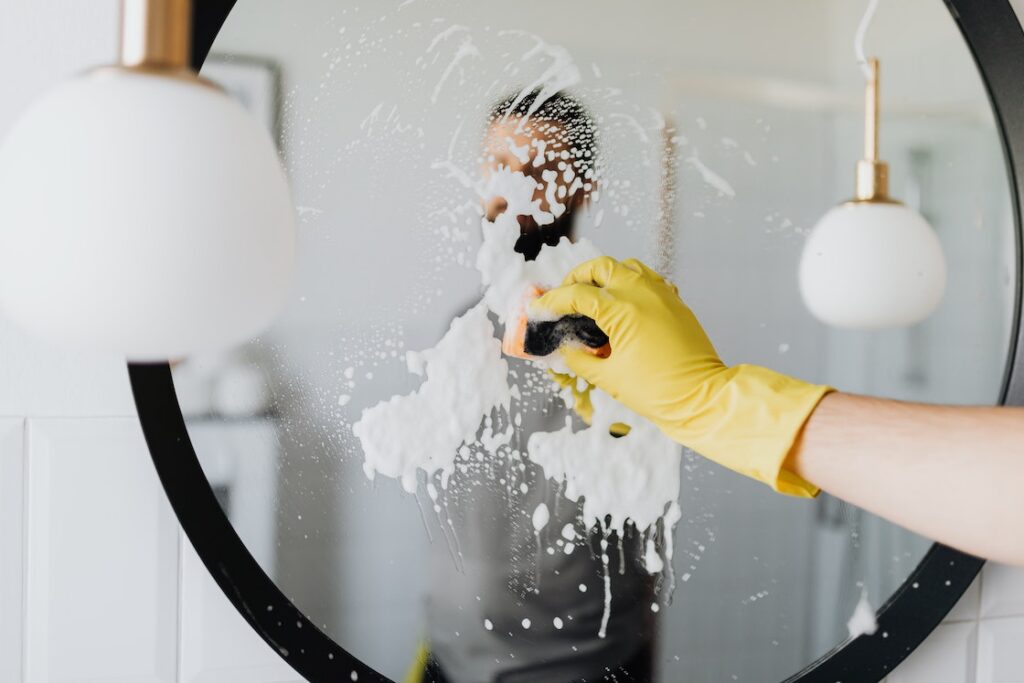When it comes to the laws centered around rental properties, the rules can vary from one state to another.
Although many states lack specific laws about whether mold is the tenant or landlord’s responsibility to deal with, there are often broader regulations that can be applied to mold growth.
Ultimately, though, there are times when handling a mold problem falls on the tenant’s shoulders, and there are times when the landlord is obligated to take care of it.
For the most part, it comes down to the circumstances that led to the issue.
What Is the Tenant Responsible For?
Generally, as a tenant, it’s your responsibility to maintain the general cleanliness and condition of your rental property.
Most of the time, if you allow a significant mold problem to develop due to a lack of upkeep, it’s going to be on you to pay for its removal or remediation.
For example, if you regularly spill liquids and neglect to clean them up, your landlord isn’t going to help you if mold grows from one of those spills.
It will also be your responsibility to handle the mold problem if your actions have created an environment where mold can flourish. Listed below are a few situations in which you would probably be the one paying for the fungus removal.
- Leaving the windows open during rain or a storm.
- Keeping the property tightly sealed/preventing proper ventilation.
- Allowing a leaking fixture to linger for a prolonged period.
As a rule of thumb, the responsibility of getting rid of mold will only land on you if the mold growth could reasonably have been prevented by responsible tenant habits. Otherwise, the burden should belong to your landlord.
What Is the Landlord Responsible For?
Even if your state’s laws don’t specifically touch on the issue of mold growth in rental properties, your landlord is almost certainly responsible for maintaining habitable premises.
If your rented home develops a fungus issue because your landlord didn’t keep up with needed repairs or maintenance, there’s a very good chance that they’ll be responsible for getting rid of the problem.
Generally speaking, landlords are responsible for things like fixing leaky pipes and repairing damaged windows, roofing, and appliances.
They’re also responsible for periodically scheduling maintenance for the various systems and appliances in the rental property.
So, if your roof suddenly starts dripping water into your home, and that leads to mold growth, you can rest assured that your landlord will need to handle it for you—but be sure they do so properly, rather than merely painting over water stains for instance.
That said, as a tenant, it’s important that you promptly report any leaks or damage that you come across to your landlord.
If you ignore the issue for weeks or months, it can lead to somewhat of a murky area when the time comes to assign responsibility for the resulting mold growth.
As long as you let your landlord know right away about a leaky pipe or malfunctioning air conditioner, you’ll have done your part.
How to Alert a Landlord
But, be sure you alert your landlord in writing, and exactly as is detailed in your lease.
If texting or calling is the fastest way to alert your landlord about mold or water leaks, do so, but always, always, always be sure to follow up that text or phone call with a written letter (that ideally includes photos) that you send exactly as outlined in your lease.
A lease usually directs a tenant to send written letters to a specific physical address, and it may include a clause about the postal method required/suggested when doing so (such as whether a letter needs to be sent by registered mail.)
Some states, such as Texas, require additional measures be taken, should you wish to be able to take advantage of certain legal recourse, such as terminating a lease early, or filing a lawsuit.
“Send the landlord a dated letter by certified mail, return receipt requested, or by registered mail, outlining the needed repairs. You may also deliver the letter in person. Keep a copy of the letter. Be sure that your rent is current when the notice is received.”
Renter’s Rights, Attorney General of Texas

That written notice sent to your landlord (as well as all other alerts or communication thereafter) is extremely important, should you eventually feel that filing a lawsuit is warranted.
[See this article for more on How to Report Mold in Rental Property]
Mold Clauses in Leases
When you’re renting a home, it’s imperative that you pay close attention to your lease agreement.
Sometimes, landlords will include clauses in these contracts that specifically absolve them from having to deal with mold problems, even when the issues are caused by their own neglect.
Granted, there’s no guarantee that such clauses will hold up in court when challenged, but who wants to deal with all of that legal hassle?
If you run into that scenario, contact a public adjuster, who can usually help you overcome these clauses, as well as similar clauses in insurance policies. (For instance, your insurance provider may turn down a claim for mold remediation, but approve a claim related to water damage—if ‘forced to do so’ by experienced public adjusters.


